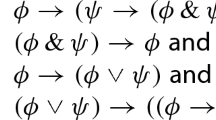Abstract
Sometimes it is pragmatically useful to prove a theorem by contradiction rather than finding a direct proof. Some reductio ad absurdum arguments have made mathematical history and the general issue if and how a proof by contradiction can be replaced by a direct proof touches upon deep foundational issues such as the legitimacy of tertium non datur arguments in classical vs. intuitionistic foundations.
In this paper we are interested in the pragmatic issue when and how to use this proof strategy in everyday mathematics in general and in particular in automated proof planning. Proof planning is a general technique in automated theorem proving that captures and makes explicit proof patterns and mathematical search control. So, how can we proof plan an argument by reductio ad absurdum and when is it useful to do so? What are the methods and decision involved?
Preview
Unable to display preview. Download preview PDF.
Similar content being viewed by others
References
Bartle, R.G., Sherbert, D.R.: Introduction to Real Analysis. John Wiley & Sons, New York (1982)
Beeson, M.J.: Automatic generation of epsilon-delta proofs of continuity. In: Calmet, J., Plaza, J. (eds.) AISC 1998. LNCS (LNAI), vol. 1476, pp. 67–83. Springer, Heidelberg (1998)
Beeson, M.J.: Automatic generation of a proof of the irrationality of e. Journal of Symbolic Computation 32(4), 333–349 (2001)
Bledsoe, W.W.: Non-resolution theorem proving. Artificial Intelligence 9, 1–35 (1977)
Bundy, A.: The use of explicit plans to guide inductive proofs. In: Lusk, E., Overbeek, R. (eds.) CADE 1988. LNCS, vol. 310, pp. 111–120. Springer, Heidelberg (1988)
Church, A.: A formulation of the simple theory of types. Journal of Symbolic Logic 5, 56–68 (1940)
Dummett, M.: Elements of Intuitionism, 2nd edn., Oxford (2000)
Gelernter, H.: Realization of a geometry theorem-proving machine. In: Proceedings of the International Conference on Information Processing, UNESCO (1959)
Lenat, D.B.: AM: an AI approach to discovery in mathematics. In: Davis, R., Lenat, D.B. (eds.) Knowledge-Based Systems in Artificial Intelligence. Mc-Graw Hill, New York (1981)
Melis, E.: AI-techniques in proof planning. In: European Conference on Artificial Intelligence, pp. 494–498. Kluwer, Brighton (1998)
Melis, E.: The “limit” domain. In: Simmons, R., Veloso, M., Smith, S. (eds.) Proceedings of the Fourth International Conference on Artificial Intelligence in Planning Systems, pp. 199–206 (1998)
Melis, E.: Automated Epsilon-Delta Proofs - A Research Story. Journal of Symbolic Computation (to be submitted, 2006)
Melis, E., Meier, A.: Proof planning with multiple strategies. In: Loyd, J., Dahl, V., Furbach, U., Kerber, M., Lau, K., Palamidessi, C., Pereira, L.M., Sagivand, Y., Stuckey, P. (eds.) CL 2000. Lecture Notes on Artificial Intelligence, vol. 1861, pp. 644–659. Springer, Heidelberg (2000)
Melis, E., Siekmann, J.H.: Knowledge-based proof planning. Artificial Intelligence 115(1), 65–105 (1999)
Melis, E., Meier, A., Siekmann, J.: Proof planning with multiple strategies. Artificial Intelligence (submitted, 2006)
Meier, A., Melis, E.: Proof Planning Limit Problems with Multiple Strategies. SEKI Technical Report SR-2004-04, FR Informatik, Universitaet des Saarlandes (2004)
Polya, G.: How to Solve it. Princeton University Press, Princeton (1945)
Robinson, J.A.: A machine-oriented logic based on the resolution principle. JACM 12 (1965)
Robinson, A., Voronkov, A.: Handbook of Automated Reasoning, vol. 1. Elsevier, Amsterdam (2001)
Schoenfeld, A.H.: Mathematical Problem Solving. Academic Press, New York (1985)
Sieg, W., Byrnes, J.: Normal natural deduction proofs (in classical logic). Studia Logica 60, 67–106 (1998)
Siekmann, J., Benzmüller, C., Autexier, S.: Computer supported mathematics with Omega. Journal of Applied Logic (in press, 2006)
Siekmann, J., Benzmüller, C., Fiedler, A., Meier, A., Normann, I., Pollet, M.: Proof Development in OMEGA: The Irrationality of Square Root of 2. In: Kamareddine, F. (ed.) Thirty Five Years of Automating Mathematics. Kluwer Applied Logic series. Kluwer Academic Publishers, Dordrecht (2003)
Wiedijk, F. (ed.): The Seventeen Provers of the World (the first volume in the AI-Systems subseries). LNCS (LNAI), vol. 3600. Springer, Heidelberg (2006)
Zimmer, J., Melis, E.: Constraint solving for proof planning. Journal of Automated Reasoning 33(1), 51–88 (2004)
Author information
Authors and Affiliations
Editor information
Editors and Affiliations
Rights and permissions
Copyright information
© 2006 Springer-Verlag Berlin Heidelberg
About this chapter
Cite this chapter
Melis, E., Pollet, M., Siekmann, J. (2006). Reductio ad Absurdum: Planning Proofs by Contradiction. In: Stock, O., Schaerf, M. (eds) Reasoning, Action and Interaction in AI Theories and Systems. Lecture Notes in Computer Science(), vol 4155. Springer, Berlin, Heidelberg. https://doi.org/10.1007/11829263_3
Download citation
DOI: https://doi.org/10.1007/11829263_3
Publisher Name: Springer, Berlin, Heidelberg
Print ISBN: 978-3-540-37901-0
Online ISBN: 978-3-540-37902-7
eBook Packages: Computer ScienceComputer Science (R0)




